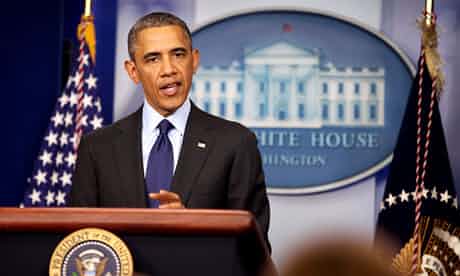The Republican wolves are out for Obama but they are yet to draw blood
Sunday 19th May 2013,
, Photograph: J. Scott Applewhite/AP
The thing people often forget about the story of the boy who cried wolf was that, at the end of the day, there was a wolf. For the past six years – since Barack Obama announced his presidential intentions – Republicans have been crying themselves hoarse. Obama, if they were to be believed, was a Kenyan-born communist Muslim with a forged birth certificate who stole the election by registering millions of ineligible voters.
Charles Ramsey reminds me of none so much as Muhammad Ali
Vox pops comes from the Latin vox populi – voice of the people. In reality, they are anything but. When the media conduct "man on the street" interviews, they rarely find anyone they weren't looking for in the first place. It is unusual to hear from people who don't care, don't know or won't vote – even if their numbers are huge on any issue. If the view or the voice doesn't fit into the preconceived thesis of the story, then it doesn't make the cut.
Globalization’s Scapegoats
Who Gets Blamed for Globalization?
It is a fitting irony that in the same week that the British government agreed to negotiate compensation for the torture of thousands of Kenyans under colonialism, a right-wing party devoted to returning the nation to its former glory would emerge as the major victor in local elections. The United Kingdom Independence Party (UKIP) won 147 council seats in recent midterm elections, coming in third in the national popular vote and perilously close to defeating the ruling Conservatives. It is a party in favor of a monocultural Britain and against immigration, multiculturalism and membership in the European Union. To demand that Britain be Great again, as UKIP leader Nigel Farage does, willfully disregards how that greatness came about and who paid for it. As the nineteenth-century French philosopher Ernest Renan wrote, “The essential characteristic of a nation is that all its individuals must have many things in common and must have forgotten many things as well.”
1963: the defining year of the civil rights movement
Tuesday 7th May 2013,
, Photograph: Time & Life Pictures/Getty Image
On 28 August, in the shadow of Lincoln's monument, Martin Luther King announced to the March on Washington during his famous "I have a dream" speech that "1963 is not an end, but a beginning". For legal segregation, it would turn out to be the beginning of the end. The year started with Alabama governor George Wallace standing on the steps of the state capitol in hickory-striped trousers and a cutaway coat declaring: "Segregation now, segregation tomorrow, segregation for ever." The civil rights leadership was ambivalent about the suggestion of a national march and President John F Kennedy was focused on foreign affairs. Within a few months Alabama would become internationally renowned as policemen turned dogs and high-pressure water hoses on children as young as six in Birmingham. Civil rights leaders were running to catch up with the militancy of their grassroots activists and the Democratic House majority leader told Kennedy: "[Civil rights] is overwhelming the whole programme".
So, why are we so loyal to a president who is not loyal to us?
Sunday 5th May 2013,
, Photograph: Rex
Back when affirmative action was white, educational institutions were created for African Americans who were barred from admission elsewhere. Historically Black Colleges and Universities (HBCUs) became the breeding grounds for the "talented tenth" – the elite class groomed to lead black America. Towards the end of the last century HBCUs had produced 75% of black PhDs, 85% of black doctors and 80% of black federal judges. Among the most prestigious was Morehouse, in Atlanta, which counts Martin Luther King, Samuel Jackson and Spike Lee among its alumni.



